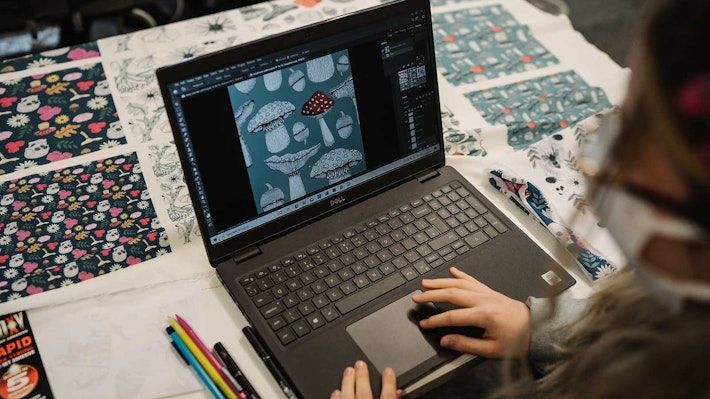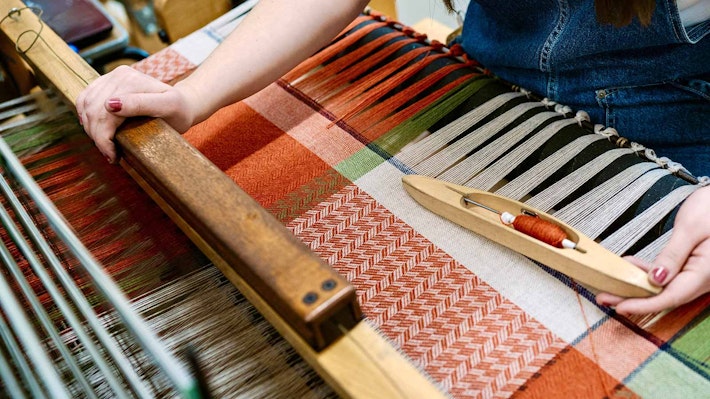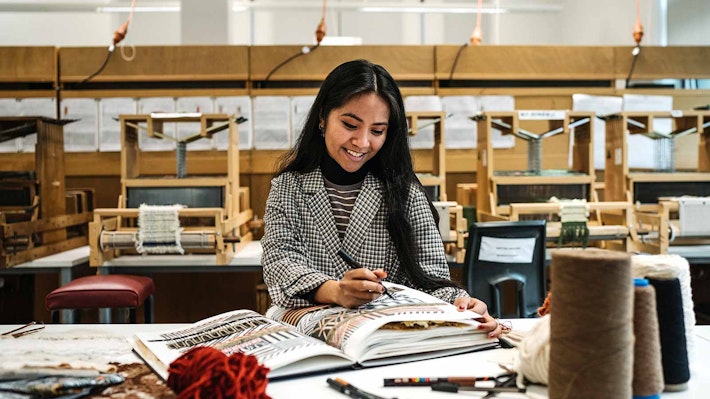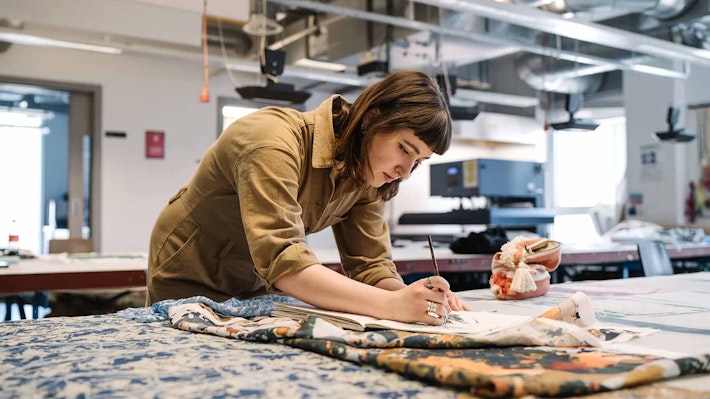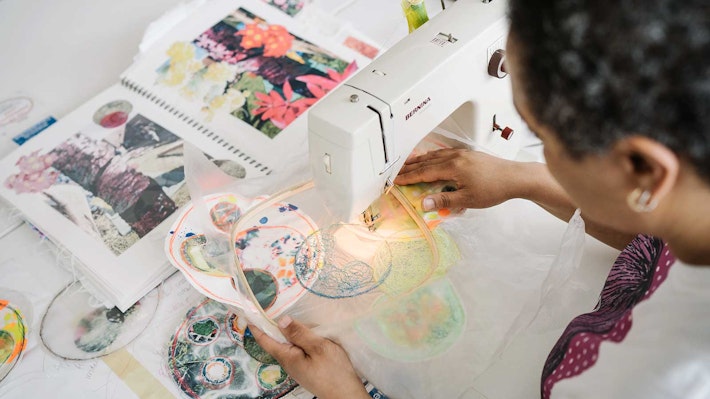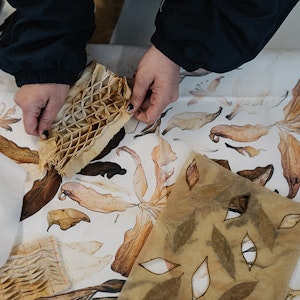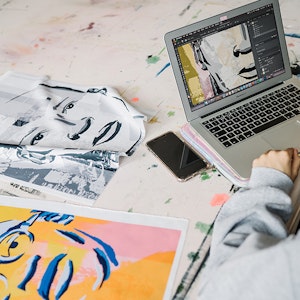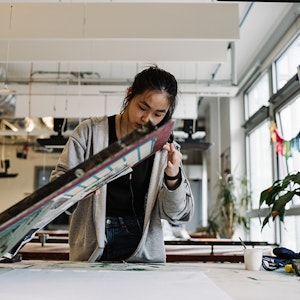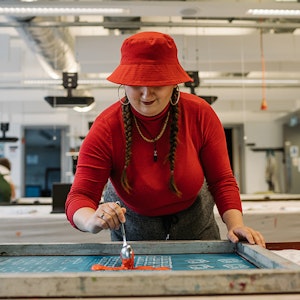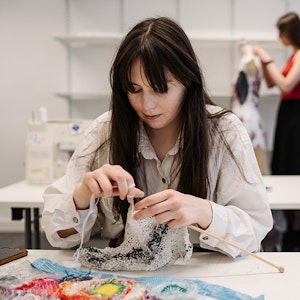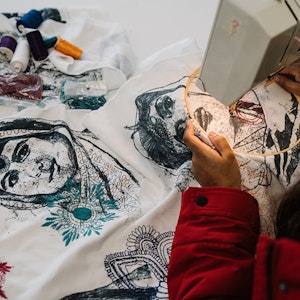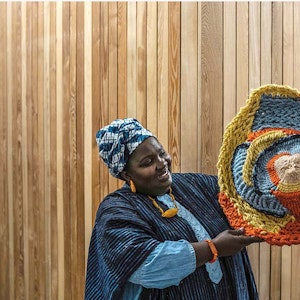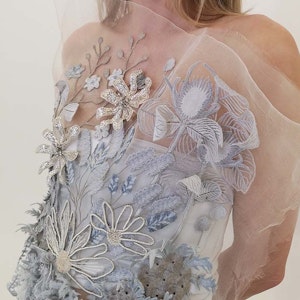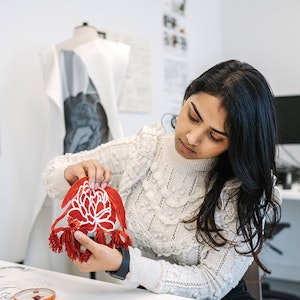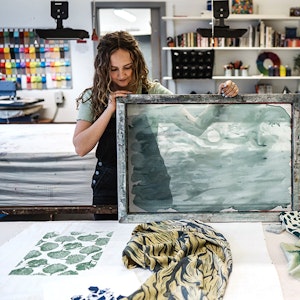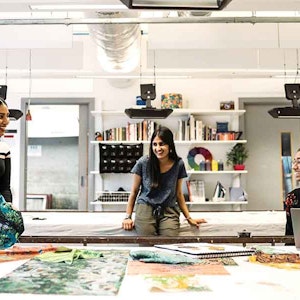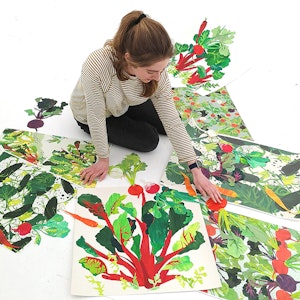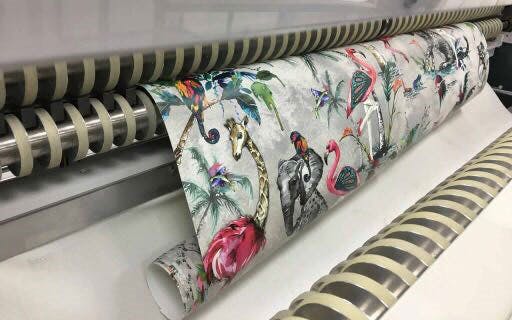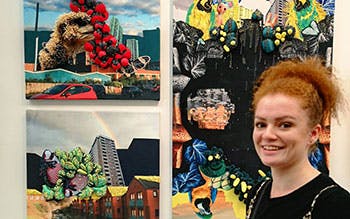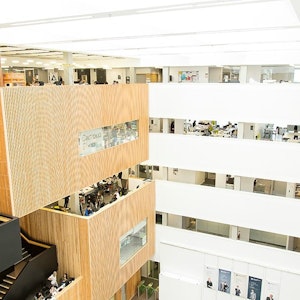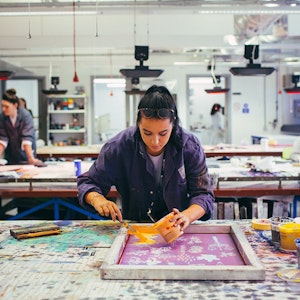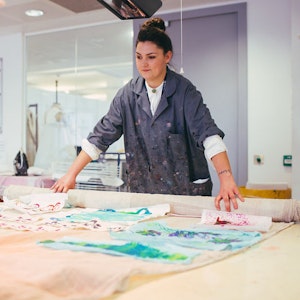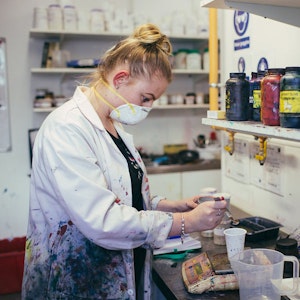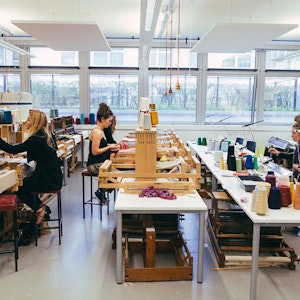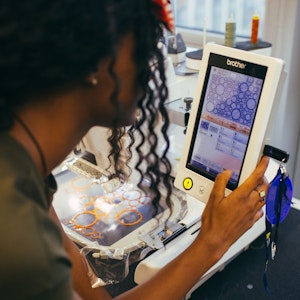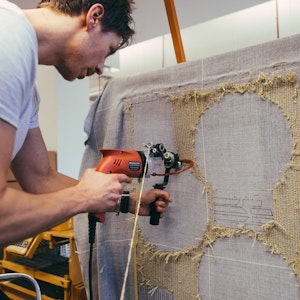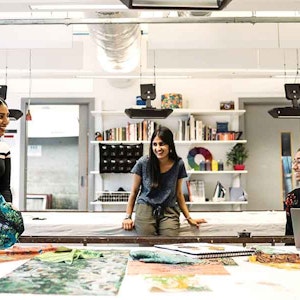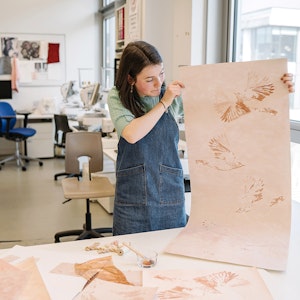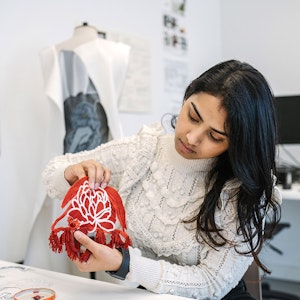Textile Design with a Foundation Year - BA (Hons)
Currently viewing course to start in 2024/25 Entry.
Our BA (Hons) Textile Design degree course gives you the opportunity to experience broad textile specialist skills combined with design and industry awareness....
- Level Foundation
- Study mode Full Time
- Location City Centre
- Award BA (Hons)
- Start date September 2024
- Fees View course fees
- School School of Fashion and Textiles
- Faculty Faculty of Arts, Design and Media
This course is:
Open to International Students
Overview
Our BA (Hons) Textile Design degree course gives you the opportunity to experience broad textile specialist skills combined with design and industry awareness. You will be guided and encouraged by an experienced teaching team engaged in textiles practice, helping you to explore your ambitions and skills, testing career aspirations in five focused teaching pathways, which will prepare you for graduation and beyond.
About foundation courses
The foundation course is an exciting step towards your chosen degree. It provides an opportunity to develop skills to equip you on your professional journey into the creative industries.
The programme encompasses elements of fashion design, fashion business, fashion branding and textile design degree routes. You will be taught in mixed groups alongside students from other Fashion & Textiles pathways providing a platform for you to share with and learn from others, while developing visual communication skills and processes. It will help you in building confidence and independence ready for the next stage of your degree.
We aim to excite, engage and challenge you, pushing you to develop into a capable student with a great fashion and textiles aesthetic as well as an enthusiasm to learn.
This four-year programme has been specifically designed to allow you to undertake additional level three study, to ensure you are successful on your chosen degree programme.
After successful completion of your foundation year, you will have the flexibility to switch (should you wish to change direction) onto a number of related undergraduate degree programmes within the School of Fashion and Textiles.
What's covered in this course?
We work with you during studio sessions in a variety of ways and you will be supported by a highly skilled technical team who manage the workshops and deliver technical demonstrations. Your timetables enable you to manage self-directed study resourcefully in relation to module deadlines.
With no house style we encourage you to embrace digital technology and traditional craft skills to enable your creativity, personal talents and professional awareness to be developed throughout the course in relation to career ambitions.
Our unique Next Step module prepares you and your graduate profile to bridge the gap between study and industry, whether as a designer maker, a trend Consultant, visual merchandiser, studio designer or in another relevant role.

Throughout the course we've learnt a variety of skills both creative and transferable. To open our minds and really 'think outside the box' is at the heart of our design work. Through our placements we undertook on the course, we have become more prepared and experienced and ready to adapt to working life and to reach the highest level of professionalism we wouldn't have achieved otherwise.
Holly Lloyd Williams, Textile Design
I'm so glad that I did the foundation course here because it is a great stepping stone before the degree level and I think I came into my first year feeling much more confident than I ever would have done if it wasn't for the foundation year. It definitely prepared me for beginning my degree course.
Lucy Ettinger, Foundation Year
Why Choose Us?
- The foundation year will enable you to explore all of the different degree pathways to help you choose the right course ready for the step up to degree.
- We are the first University in the country, and second in the world, to have Coloreel embroidery technology which allows students to explore modulated colour change within their design work. This opens up new creative possibilities whilst increasing the efficiency and minimising thread waste.
- On the foundation course you will be part of a community, building your knowledge of the equipment and facilities available, getting to know staff and your fellow students through social events and our end of year exhibition.
- You are supported every step of the way! Our friendly academic and technical teams will encourage your creative individuality. Personal tutorials ensure you can regularly discuss your progress and career aspirations.
- Our cutting-edge facilities comprise of industry-standard technology and equipment to ensure you are developing professionally relevant skills and awareness.
- Live briefs expose you to leaders in the design field and help you develop important collaborative skills and industry networks.
- We support you in entering key national competitions such as the Bradford textile society design competition, Hand & Lock prize for embroidery and Idott to get your CV looking sharp.
Open Days
Join us for an on-campus Open Day where you'll be able to meet us in person. Booking for the next event isn’t open yet. Register your interest below and we’ll email you as soon as booking goes live.
Next Open Day: 29 June 2024
Entry Requirements
These entry requirements apply for entry in 2024/25.
All required qualifications/grades must have been achieved and evidenced at the earliest opportunity after accepting an offer to help confirm admission and allow for on-time enrolment. This can also include other requirements, like a fee status form and relevant documents. Applicants can track their application and outstanding information requests through their BCU mySRS account.
80 UCAS tariff points
If you have a qualification that is not listed, please contact us.
Fees & How to Apply
UK students
Annual and modular tuition fees shown are applicable to the first year of study. The University reserves the right to increase fees for subsequent years of study in line with increases in inflation (capped at 5%) or to reflect changes in Government funding policies or changes agreed by Parliament. View fees for continuing students.
Award: BA (Hons)
Starting: Sep 2024
- Mode
- Duration
- Fees
- Full Time
- 4 years
- £9,250 in 2024/25
- Apply via UCAS
International students
Annual and modular tuition fees shown are applicable to the first year of study. The University reserves the right to increase fees for subsequent years of study in line with increases in inflation (capped at 5%) or to reflect changes in Government funding policies or changes agreed by Parliament. View fees for continuing students.
Award: BA (Hons)
Starting: Sep 2024
- Mode
- Duration
- Fees
- Full Time
- 4 years
- £16,085 in 2024/25
Guidance for UK students
UK students applying for most undergraduate degree courses in the UK will need to apply through UCAS.
The Universities and Colleges Admissions Service (UCAS) is a UK organisation responsible for managing applications to university and college.
Applying through UCAS
- Register with UCAS
- Login to UCAS and complete your details
- Select your course and write a personal statement
- Get a reference
- Pay your application fee and submit your application
You are not required to submit a portfolio for this course.
Course in Depth
Foundation year
In your Foundation Year, you will gain a grounding in a variety of skills from each of our degree pathways, including blog writing, textile techniques, branding, creating garments and more. You will be able to explore the Fashion and Textiles workshops and CAD suites to pursue your individual interests.
In order to complete this course you must successfully complete all the following CORE modules (totalling 120 credits):
Fashion and Textiles are two very large and interrelated global industries, they encompass many different job roles. The two disciplines also support a variety of related approaches and activities ranging from business to art practices.
This module will provide an overview of processes and skills that are essential to fashion and textiles and also give you the opportunity to develop the skillset and knowledge that interests you. You will be allowed to develop personal approaches that can incorporate one or a mixture of making, business analysis or communications.
This module will focus on techniques and strategies for identifying and researching trends, documenting them and how trend analysis can be used in professional practice. In response to seminar discussions and workshops you will experiment with layout and physical compositions to produce a visual interpretation of your findings. You will analyse past, present and future trends using a variety of primary and secondary sources. You will evidence ongoing reflective practice which includes written and visual analysis.
This module will allow you to develop your skills and understanding of a business practice through the set-up and development of a brand. Contextual lectures will help you to consider and predict what are the key drivers and influencers that will impact the development of your brand exploring: social changes, world events, industrial and technological advancements.
This module you will allow you to plan, develop and deliver a project that draws on your own, personal creative strategies to facilitate the realisation of ideas appropriate for progression on your BA course.
Year one
Guided and encouraged by an experienced teaching team, engaged in current research or practice, and through workshop experiences supported by e-learning, you investigate key areas of weave, knit, embroidery and printed textiles before choosing one or two technical areas to explore in the first year of the course.
In order to complete this course a student must successfully complete all the following CORE modules (totalling 120 credits):
This module introduces students to four core design processes: print, weave, knit and embroidery, through extended workshop technical delivery and personal creative expression through making. There will be a strong focus on materiality and fabric properties.
This introduces students to the initial stages of the design process, focusing on the importance of original image generation, drawing and self-expression. Students will explore diverse approaches to generating visual information and apply this to begin to build design compositions.
This module introduces the historical and cultural context of design with international influences, in order to provide a foundation knowledge for understanding key textile design styles to support studio practice.
In this module, you will experience a client focused design journey, building experience of working with colour and extending your technical knowledge. Colour will be explored through research, drawing, material investigation and technical development. There will be an emphasis on CAD and digital technologies in the development of a targeted, co-ordinated collection and visualisation of ideas in relation to a specified context, simulating a commercial design project.
Year two
In your second year, you explore trends and predictions in fashion and interior industries and explore the scope of career sectors and job roles open to textile designers.
You shape your learning by choosing from a range of industry-focused and entrepreneurial design challenges and build professional experience through a collaborative design challenge or work experience – all designed to help you identify your strengths and career interests.
In order to complete this course you must successfully complete all the following CORE modules (totalling 100 credits):
This module provides a professional and cultural context of Textile Design. The lecture programme and participatory workshops / seminars encourage you to think broadly and critically about contemporary social and professional issues in relation to the place of textiles within international society, preparing you to consider key agendas in relation to your own career path interests.
This module provides the opportunity to develop important interpersonal skills alongside career pathway knowledge and understanding. The module includes working collaboratively and independently on writing and practically undertaking design briefs that relates to one of the potential career pathways. You will apply knowledge gained about the chosen sector such as product / client / routes to market / production / marketing and promotion, in developing and communicating a viable industry facing project.
This module has been designed to test and explore potential career pathways within the textile industry. It builds on the theoretical understanding gained in the Textiles in Contemporary Context module, through a practical design experience.
In order to complete this course a student must successfully complete at least 20 credits from the following list of OPTIONAL modules:
The purpose of this module is to enable you to develop professional attributes and subject skills through experience in the work place, and to critically reflect upon your learning in that context. You will normally be expected to arrange your own placement, with support from academic staff and ADM Careers+.
This module provides an opportunity for you to apply your knowledge and skills to an external, professional brief. The brief will be set by an external client/agency, in consultation with your supervisor, and it could be a ‘real life’ problem to be solved, or a simulation. It is an opportunity for you to engage in a professional manner with an aspect of your subject area, which contributes to the development of employability skills within the supportive infrastructure of the University. Where appropriate, the project may involve interdisciplinary collaboration with students from other courses. In this way, it reflects the collaborative, flexible nature of employment within the Creative Industries.
The module is an opportunity to learn and critically reflect on the skills of collaboration by enabling you to create an interdisciplinary project with students from complementary disciplines, or with academic staff. Collaboration is a vital employability skill within the Creative Industries and this module allows you to develop these skills, making use of University facilities and with the support of academic staff. Within this module framework, several kinds of collaborative opportunities are available. For example, with the approval of your supervisor, you can determine a project based on your own interests; your supervisor may set you a predetermined project to enable you to work with other students in a way that is appropriate to your subject area; or there may be opportunities for you to collaborate with staff on research projects. In all cases, you must apply your subject skills to an interdisciplinary project which will be agreed in advance with your supervisor.
Core modules are guaranteed to run. Optional modules will vary from year to year and the published list is indicative only.
Year three
Your final year gives you the opportunity to hone your portfolio and experience to suit your career ambitions through focused projects.
In order to complete this course you must successfully complete all the following CORE modules (totalling 120 credits):
This module provides the opportunity to undertake a comprehensive and independent study on a topic of your choice within the field of art, design or material culture. Through a written, illustrated dissertation, you will critically explore your chosen topic, presenting your argument using established academic conventions. Group tutorials with a designated tutor will provide stimulating and supportive sessions to help you develop your research ideas and that of others.
This module enables you to reflect and synthesise previous projects in order to establish a creative direction and career-focused concept / brief to drive personal research and development of the Professional Project. As a creative practitioner, it is an important skill to be able to evaluate successes and evolve ideas from one project to another.
The module builds and demonstrates a personal focus of study as a culmination of the knowledge, understanding and career aspirations of the individual in relation to textile design contexts. Practical and theoretical study combine to explore design concepts answering a personal brief with a professional focus. The direction the project takes will be in relation to your experiences of career-focused teaching and immediate professional plans on graduation.
This module supports the process of exhibiting / promoting the final project, with a reflective and evaluative emphasis aiming to initiate a viable and continued creative journey. It has been designed to help bridge the gap from academia into industry, and offers support with developing personal promotion, branding and marketing material and building a digital presence. This is also an opportunity to engage in supporting theoretical research to confirm the viability of a proposal/direction, and confirm future goals and career aspirations.
Download course specification
Download nowCourse structure
The Foundation year encourages experimentation and play whilst exploring a breadth of skills to help you with your step up to your degree.
Year 1
The first year is all about experimentation! You will engage with different approaches to drawing and idea generation, learn in depth about materials, composition and colour in relation to textile design, and be challenged with working to your first client brief. You will be introduced to our workshops to learn and sample in the areas of woven, knitted, embroidered and printed textiles, as well as MAT_er.LAB, our biomaterials experimental laboratory space. You will identify the technical language (or languages) that best suit your skills and interests.
A contextual lecture/ seminar programme builds knowledge of historical textiles which provides the vital reference points needed within contemporary design as well as critical thinking skills.
Year 2
In your second year, you will extend your technical skills while beginning to understand the scope of career opportunities open to you. You will start the year by learning about key industry sectors and developing a personal CV and creative promotional material to help you establish your areas of interest.
You will then be introduced to and choose practical design challenges from across five key employment sectors which have been designed to help you consider your place within the industry:
- Bespoke Fashion Textiles
- Contemporary Culture and Craft
- Retail and Promotion
- Styling and Trend Forecasting
- Surface Pattern and Technologies
You will study market and client awareness, trends in both fashion and interior design sectors, commercial considerations with industry-facing projects as well as business principles, ethics and sustainability issues.
You can then choose to end the year by undertaking a professional Work Placement, Collaborative Practice or Live Brief experience, building your knowledge in the workplace or working alongside other creative students from across the Faculty.
Year 3
In Year 3 you will continue your design journey in relation to your chosen career pathway and through your choice of textile language, but with a much more independent and self-directed focus.
You will begin by writing your dissertation around a subject of interest. This will often kickstart themes and concepts that can form the basis of practical work to follow.
The final project is split into two modules, to help structure the experience. You will firstly engage in broad and personal contextual research to inform and inspire you in creating a professional portfolio of extended design work and resolve a creative brief that is aligned with your creative ambitions.
Our unique Next Step module then equips you with all you need to make the leap into employment or postgraduate study. You will create an action plan, extend your portfolio through targeted competition entries and promote your strengths and achievements via digital platforms – all designed to help you leave confident in pursuing your career ambitions.
The learning environment
The learning environment includes a wide range of learning and teaching methods, an experienced teaching team engaged in current research/practice, and studio/workshop experiences supported by e-learning. There is access to both digital technology and traditional textile craft workshops. Equipment includes a Mimaki digital printer, jacquard loom, computerised AVL studio looms, digital embroidery machines and laser cutting equipment, in addition to traditional facilities including print tables, transfer press, knitting machines, looms and rug tufting guns.
Supportive tuition in specialist and combined groups throughout the course fosters the interchange of ideas. The diverse experience of the academic staff reflects the course ethos – all are practising designers/visual artists, many working internationally.
The course actively fosters links with organisations (including museums and galleries) and industry, providing a continuously updated contemporary educational experience.
Studio activities
Practical drawing sessions help to get design projects underway in a friendly and supportive environment, building your skills and confidence by sharing and learning as part of a peer group.
We help to prepare you for the real world by running design projects as if in a commercial studio. With role-play sessions, reviews and critiques, you get the opportunities to test your professional networking skills, ready to take to your perfect job.
Working alongside friends to learn and understand the subject of textiles in relation to the wider industry you will participate in seminars to discuss contemporary design issues, such as ethical fashion, global trends and international manufacturing, while working out what makes you tick.
Foundation student project
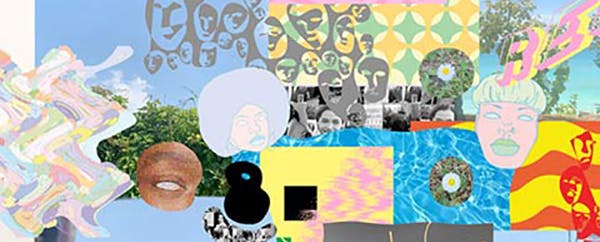
Students on the Fashion and Textiles Foundation took part in The Signature Project where they used personal creative strategies to show off a range of skills and showcase their personal design style in preparation for the next step of their chosen degree.
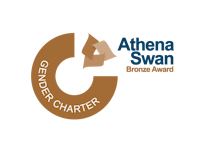
Athena Swan Bronze Award
Our Jewellery, Fashion and Textiles courses have been awarded the Athena Swan Bronze Award for our commitment to Equality, Diversity and Inclusion (EDI).
Athena SWAN is a quality charter mark framework and accreditation scheme established and managed by the UK Equality Challenge Unit in 2005 that recognises and celebrates good practices in higher education and research institutions towards the advancement of gender equality: representation, progression and success.
Employability
Enhancing your employability
Our BA (Hons) Textile Design degree is designed to ensure you have the skills, vision and creativity to appeal to a range of employers.
With strong understanding and skills in traditional and digital design, you will become adept at a number of textile processes, including print, embroidery, weave and knit. You’ll also gain a clear vision of where you fit in the industry in order to build a strong personal and professional portfolio, using promotional and marketing skills you’ll be prepared to take to future job roles.
Links to industry
The College of Fashion and Textiles works with local, national and international businesses to enhance student learning through placements, workshops, live briefs and guest lectures from industry professionals.
Our Graduates
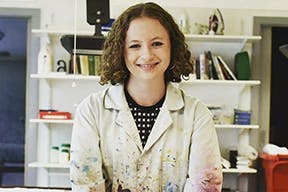
Rebecca Lewis
Since graduating I have interned with Next menswear in the Print and Graphics Department. My internship with them came after my work was recognised at the 2018 New Designers exhibition, a hub for textile graduates to exhibit their work and make valuable contacts within the industry. The design department at Next contacted me directly after the exhibition and offered me the place.
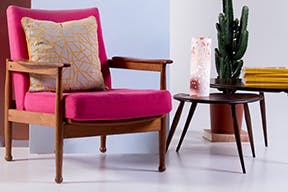
Kate Hollowood
My current role is designer maker and company director of my company, Kate Hollowood Design. I work for myself and am currently the only employee, meaning I am responsible for everything involved in running a creative business; from making accounts to following up leads and attending trade shows as well as admin, pricing, quotes, diary bookings, product development and marketing…. the list goes on!
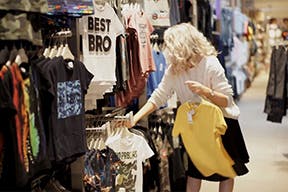
Gabbie Armstrong
I was lucky to have a part time job in the fashion industry during my final year at university. It wasn’t easy to juggle work and study commitments at the same time but I was dedicated to building my career as soon as I could.
The trainee position at Outfit Fashion helped me to understand the company’s structure and the different roles I could have in the industry, but most importantly I learnt about applying the principles of buying/merchandising and design that I had been learning throughout the course. Once I graduated the position became a full time role and I was able to develop my skills within this field even further.
Chloe Frost
Assistant Editor - Stylus
Watch the video below to find out how Chloe's time on our BA (Hons) Textile Design course helped her discover her dream career.
Textile Design Career Paths
Graduate Sophie Hawkesford offers an insight into the wide range of career paths that are accessible with a textile design degree.
Follow us on Instagram @TextilesBCU
There’s no better way to see what our students are creating. Instagram was made for beautiful images, so take a look at ours.
International
Birmingham City University is a vibrant and multicultural university in the heart of a modern and diverse city. We welcome many international students every year – there are currently students from more than 80 countries among our student community.
The University is conveniently placed, with Birmingham International Airport nearby and first-rate transport connections to London and the rest of the UK.
Our international pages contain a wealth of information for international students who are considering applying to study here, including:
- Explore some of the good reasons why you should study here.
- Find out how to improve your language skills before starting your studies.
- Find all the information relevant to applicants from your country.
- Learn where to find financial support for your studies.
Our international students
Our course is perfectly suited to students from around the world as we approach textiles from an international viewpoint. Students share experiences and learn from each other, and the teaching focuses, where possible, on the international design industry, from trends to manufacturing contexts, preparing graduates for jobs in the global market. Graduates from the course have worked overseas including USA, Saudi Arabia, France, Laos, Sweden and Finland.
International students who have a serious interest in studying with us but who perhaps cannot meet the direct entry requirements, academic or English, or who have been out of education for some time, can enter Birmingham City University International College (BCUIC) and begin their degree studies.
BCUIC is part of the global Navitas Group, an internationally recognised education provider, and the partnership allows students to access the University’s facilities and services and move seamlessly through to achieving a Bachelor’s degree from Birmingham City University.
Facilities & Staff
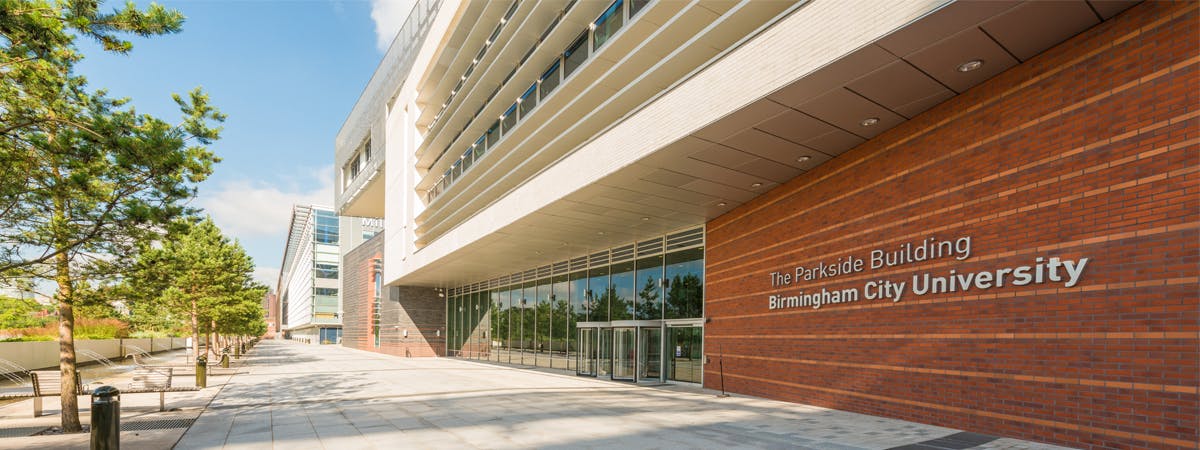
Our Facilities
You'll be based in our School of Fashion and Textiles, within The Parkside Building. The Parkside Building is part of our new multi-million pound City Centre Campus development in the heart of Birmingham's Eastside development.
Our staff
Louise Martin
Foundation Year Course Director
Louise’s Masters in textile design established the foundation for her design journey. From this platform, Louise started to build a career as an interior designer, regional design manager, stylist, and as a lecturer in fashion and textiles. Louise now has over 10 years' teaching experience as a lecturer.
More about LouiseNatalie Martin
Lecturer in Foundation Fashion and Textiles
After graduating with BA (Hons) Fashion Design from BCU Natalie has worked with brands such as Joseph Turvey and Hades Knitwear as a freelance designer, production assistant and illustrator as well as working on show production for presentations at London Fashion Week Mens. Working hands-on with small, luxury brands has enabled her to gain a...
More about Natalie